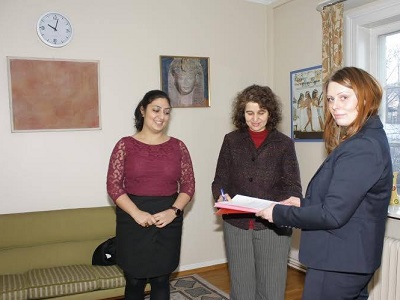
By Huda Julie Webb-Pullman
Norway, Washington DC, Sydney, Australia and Wellington, New Zealand have already done it. The United Kingdom, Germany, Greece and Italy are about to.
Activists all around the planet are today presenting Egyptian embassies and consulates with the demands of more than 12,000 people worldwide to permanently open the Rafah crossing, leave the tunnels alone, and allow travel and trade for Gazans trapped by the Israeli siege.
First off the mark was Norway, where Lene Oline Sedolfsen presented the petition to the Egyptian diplomats. Next was Washington DC, where Pam Bailey accompanied Medea Benjamin and Gael Murphy to the Egyptian consulate where they presented the demands to Dr. Yasser Elwy. In Sydney James Godfrey and Michael Coleman from Free Gaza Australia handed it over to consular official Ahmed Morsy, while in New Zealand Egyptian embassy official Mahmoud Zayed received it from Julie Webb-Pullman in Wellington.
The diplomats all accepted the petitions with courtesy and respect, promising to forward them to their superiors in Cairo.
They also made the same points:
• While Egypt is concerned about the situation in Gaza, it is primarily an issue for Israel as the occupying power. Thus, for example, Egypt does not want to formalize or legalize the tunnels — which would let Israel off the hook, while also jeopardizing Egypt’s security.
• Egypt has a right to deal with security issues in the Sinai Peninsular. There is no policy calling for, or a desire to impose, collective punishment. Its restrictions on traffic in and out of Rafah come only when there is terrorist activity in the Sinai. Egypt must also worry about its population there, so there is an inevitable, unavoidable trade-off.
• Egypt is working to end the occupation by supporting John Kerry’s so-called “peace process.”
• Egypt feels a strong bond with the Palestinians, and always will.
While it is not surprising to hear them all singing from the same songbook, they may find themselves surprised by the increasingly loud chorus from people around the world unsatisfied with this response.
Nothing any of them said justifies the role of Egypt in the continued closure of Gaza, and the ongoing suffering of 1.7 million people.
“Ultimately, Rafah must be expanded to allow security without closure, as well as the movement of goods, in addition to people,” said Pam Bailey after the meeting.
Is this a realistic prospect?
It certainly is. Earlier this month Israel rejected a high-tech container scanner at the Kerem Shalom crossing that Dutch officials consider would provide a solution to Israel’s security concerns about Gazan exports.
If the Egyptians are serious about their bond with Palestinians, avoiding collective punishment, and dealing with security issues, they and the Netherlands could negotiate its relocation to Rafah – and open the border forthwith.
– Huda Julie Webb-Pullman is a freelance journalist from New Zealand who has been living in and writing from Gaza since 2011. She contributes to SCOOP Independent News, Palestine Chronicle, and other online news sites. She contributed this article to PalestineChronicle.com.





